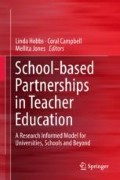Abstract
The purpose of this chapter is to consider the threats and challenges which impact on the sustainability of a partnership. By identifying elements that contribute to success and underpin the future sustainability of the relationships, an understanding of how the theoretical framing (Interpretive Framework) for university–school partnerships draws together the facilitation and maintenance of partnerships is gained. The focus is a consideration of each of the aspects of the Interpretive Framework, as outlined in earlier chapters, and a discussion of the threats and challenges evident in data drawn from partnership stakeholders including teacher educators, pre-service teachers, teachers and principals. Three key issues drawn from the data are raised and analysed and are presented as sub-themes. These sub-themes are the elements required for: sustainability; measuring sustainability; and threats to sustainability of partnership practices.
Access this chapter
Tax calculation will be finalised at checkout
Purchases are for personal use only
References
Arthur, M., Gordon, C., & Butterfield, N. (2003). Classroom management: Creating positive learning environments. Southbank: Thomson.
Bybee, R. W. (1989). Science and technology education for the elementary years: Frameworks for curriculum and instruction. Washington, DC: The National Centre for Improving Instruction.
Bloomfield, D, & Nguyen, H.T. (2015). Creating and sustaining professional learning partnerships: activity theory as an analytic tool, Australian Journal of Teacher Education, 40(11).
Burton, S. L., & Greher, G. R. (2007). School-university partnerships: What do we know and why do they matter? Arts Education Policy Review, 109(1), 13–24.
Chubb, I. (2013). Science, technology, engineering and mathematics in the national interest: A strategic approach: A Position Paper. Canberra: Commonwealth of Australia.
Hobbs, L., Chittleborough, G., Jones, M., Kenny, J., Campbell, C., Gilbert, A., & Redman, C. (2015). School-based pedagogies and partnerships in primary science teacher education: The Science Teacher Education Partnerships with Schools (STEPS) Project: Office of Learning and Teaching.
Kruger, T., Davies, A., Eckersley, B., Newell, F., & Cherednichenko, B. (2009). Effective and sustainable university-school partnerships: Beyond determined efforts by inspired individuals, Teaching Australia—Australian Institute for Teaching and School Leadership Limited.
Newman, J. (2014). Measuring policy success: Case studies from Canada and Australia. Australian Journal of Public Administration, 73(2), 192–205.
Peters, J. (2011). Sustaining school colleagues’ commitment to a long-term professional experience partnership. Australian Journal of Teacher Education, 36(5), 1–15.
Suchman, L. (1994). Working relations of technology production and use. Computer Supported Cooperative Work, 2(1–2), 21–39.
Teacher Education Ministerial Advisory Group. (TEMAG) (2014). Teacher education ministerial advisory group issues paper. TEMAG. From http://studentsfirst.gov.au/files/temag_issues_paper_-_april_2014_4.pdf.
Tytler, R. (2007). Re-imagining Science Education: Engaging students in science for Australia’s future. Australian Education Review, Australian Council for Educational Research.
Tytler, R., Osborne, J. F., Williams, G., Tytler, K., Clark, J. C., & Tomei, A. (2008). Opening up pathways: Engagement in STEM across the Primary-Secondary school transition: A review of the literature concerning supports and barriers to Science, Technology, Engineering and Mathematics engagement at Primary-Secondary transition. Commissioned by the Australian Department of Education, Employment and Workplace Relations. Melbourne: Deakin University.
Author information
Authors and Affiliations
Corresponding author
Editor information
Editors and Affiliations
Rights and permissions
Copyright information
© 2018 Springer Nature Singapore Pte Ltd.
About this chapter
Cite this chapter
Herbert, S., Redman, C., Speldewinde, C. (2018). Sustaining School–University Partnerships: Threats, Challenges and Critical Success Factors. In: Hobbs, L., Campbell, C., Jones, M. (eds) School-based Partnerships in Teacher Education. Springer, Singapore. https://doi.org/10.1007/978-981-13-1795-8_9
Download citation
DOI: https://doi.org/10.1007/978-981-13-1795-8_9
Published:
Publisher Name: Springer, Singapore
Print ISBN: 978-981-13-1794-1
Online ISBN: 978-981-13-1795-8
eBook Packages: EducationEducation (R0)

